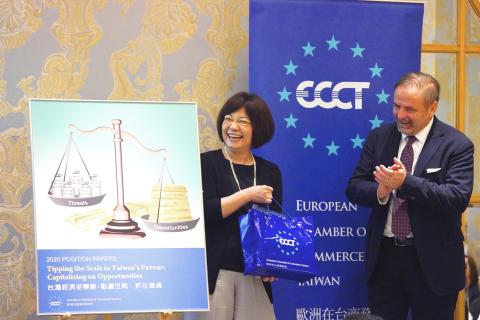The European Chamber of Commerce Taiwan yesterday released its annual position paper, calling on the government to further relax labor rules and liberalize the energy market.
“While the world has grown increasingly volatile, uncertain and complex, social trends and advances in technology are opening up new golden opportunities,” chamber chairman Giuseppe Izzo said at the release of the paper.
Taiwan lacks skilled and unskilled workers, and the shortage is weighing down its ability to capitalize on economic opportunities, the paper said.

Photo: CNA
The trade group recommended further labor law reforms to develop, attract and retain talent to address the issue.
Further flexibility is needed in work hour rules, and the wind energy sector in particular should be included in the list of industries that are exempted from observing the weekly regular leave day requirement so that work schedules could meet the requirements for offshore construction work, it said.
The chamber also called for less stringent visa requirements for foreign professionals, allowing more foreign employees in the service sector and improving the protection of foreign workers.
Transitioning from fossil fuels to low or zero-emission alternatives is crucial to address climate change and represents a golden opportunity for Taiwan given its perfect conditions to tap into abundant alternative energy sources, the chamber said.
However, more needs to be done to promote renewable energy, including deregulating the energy market to allow multiple business models for the installation, sales and use of electricity generated from renewable energy sources, the group said.
The chamber called for increased public investment in grid infrastructure to accommodate renewable energy capacity.
It also called for changes to standard power purchase agreements signed between Taiwan Power Co (台電) and wind developers, as well as to administrative contracts between wind developers and the Ministry of Economic Affairs, to deal with curtailments in the event of delays in ensuring grid connections.
The group called for the opening of coastal areas, highways, railways, harbors and industrial parks to the installation of onshore wind turbines and urged new repowering rules to allow developers to replace old turbines without repeatedly having to go through the approval processes.
Authorities have deviated from international standards and best practices, which is hampering the ability of the electrical engineering and equipment industry to upgrade to products and services that are safer and of a higher quality, the chamber said.
There also remain instances of a lack of transparency as well as inconsistencies in the implementation of regulations and procedures, it said, referring to different levels of commodity taxes on products.

Taiwan Semiconductor Manufacturing Co (TSMC, 台積電) yesterday said that its investment plan in Arizona is going according to schedule, following a local media report claiming that the company is planning to break ground on its third wafer fab in the US in June. In a statement, TSMC said it does not comment on market speculation, but that its investments in Arizona are proceeding well. TSMC is investing more than US$65 billion in Arizona to build three advanced wafer fabs. The first one has started production using the 4-nanometer (nm) process, while the second one would start mass production using the

A TAIWAN DEAL: TSMC is in early talks to fully operate Intel’s US semiconductor factories in a deal first raised by Trump officials, but Intel’s interest is uncertain Broadcom Inc has had informal talks with its advisers about making a bid for Intel Corp’s chip-design and marketing business, the Wall Street Journal reported, citing people familiar with the matter. Nothing has been submitted to Intel and Broadcom could decide not to pursue a deal, according to the Journal. Bloomberg News earlier reported that Taiwan Semiconductor Manufacturing Co (TSMC, 台積電) is in early talks for a controlling stake in Intel’s factories at the request of officials at US President Donald Trump’s administration, as the president looks to boost US manufacturing and maintain the country’s leadership in critical technologies. Trump officials raised the

‘SILVER LINING’: Although the news caused TSMC to fall on the local market, an analyst said that as tariffs are not set to go into effect until April, there is still time for negotiations US President Donald Trump on Tuesday said that he would likely impose tariffs on semiconductor, automobile and pharmaceutical imports of about 25 percent, with an announcement coming as soon as April 2 in a move that would represent a dramatic widening of the US leader’s trade war. “I probably will tell you that on April 2, but it’ll be in the neighborhood of 25 percent,” Trump told reporters at his Mar-a-Lago club when asked about his plan for auto tariffs. Asked about similar levies on pharmaceutical drugs and semiconductors, the president said that “it’ll be 25 percent and higher, and it’ll

CHIP BOOM: Revenue for the semiconductor industry is set to reach US$1 trillion by 2032, opening up opportunities for the chip pacakging and testing company, it said ASE Technology Holding Co (日月光投控), the world’s largest provider of outsourced semiconductor assembly and test (OSAT) services, yesterday launched a new advanced manufacturing facility in Penang, Malaysia, aiming to meet growing demand for emerging technologies such as generative artificial intelligence (AI) applications. The US$300 million facility is a critical step in expanding ASE’s global footprint, offering an alternative for customers from the US, Europe, Japan, South Korea and China to assemble and test chips outside of Taiwan amid efforts to diversify supply chains. The plant, the company’s fifth in Malaysia, is part of a strategic expansion plan that would more than triple